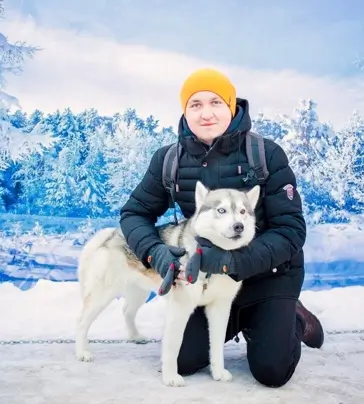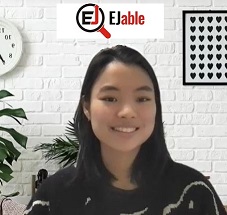A Chat with Ruslan Kadyrov of Rakuten About Working in Japan
Name: Ruslan Kadyrov
Title: Software Engineer
Organization: Rakuten
Date of birth: January 14, 1996
Hometown: Leninogorsk, Tatarstan Republic, Russia
Number of years in Japan: 2 years




Introduction: Living in Japan, it is impossible not to know or hear about Rakuten. Today, we are joined by Ruslan Kadyrov, a software engineer at Rakuten, for an interview. He has been working in Japan for the past two years, and he is here to share his experience of working in IT and living here in Japan so far with EJable.com’s Ryoko.
Video Interview
Transcript of The Video
Ryoko: Hi, Ruslan; thank you for joining us here at EJable. Today we wish to know a little bit about your experience working in IT here in Japan today, and a bit more about how you feel about working in Japan and living in Japan. I’m really happy to have you here today. So first, I want to start by asking you to tell us a little bit about your background. So, a little bit of your introduction, please.
Ruslan: OK so yeah, I’m Ruslan. I’m originally from Russia, and I’ve been living and working in Japan for around two years. It will be two years in January. Earlier, I’d been doing software engineering work back in Russia for about three years, and yeah, so I decided that it would be a good chance to live and work in Japan.
Ryoko: That’s very nice. And how did you come to the idea of working in Japan?
Ruslan: Uh, yeah. Honestly, I have never been a fan of Japan, like, some people really like anime or culture and so on, but I always had some desire, a wish to live abroad.
I tried to apply to some companies in Europe, but I was not so successful. My story started when I started my master’s degree in Moscow. We had a Facebook kind of Russian social networking site where I received a message from a Japanese lady. I was surprised that she was inside this Russian social network, and I thought that it was a scam. However, I decided to reply to her message. She said that they were trying to hire Russian graduates from top universities for Japanese companies. However, at that moment, I had just started my master’s, and I said it was not the best time. I requested her to contact me after two years. And, she did, yeah, and she offered me some companies. I shared my CV, did some online test assessments, and yeah. And after that, a couple of managers and engineers from my current team arrived in Moscow to conduct interviews. It was about 100 candidates at that time. Out of that around 7 guys got an offer from the company.
Ryoko: Oh, I see. I guess your first encounter with Japan was with that lady.
Ruslan: Yeah
Ryoko: oh, okay, I see. Were you interested in working in Japan, or was it just like that you got an offer, and you wanted to move abroad, and you took that offer?
Ruslan: Yeah, I think the second one. I just thought that Japan was a great country and one of the largest economies in the world with polite & peaceful people as I read online. So, I decided, yeah, why not?
Ryoko: OK, and can I know a bit more about the process of moving to Japan? Was it difficult? And well, do you speak Japanese?
Ruslan: I speak Japanese a little bit now I do. But the whole process of moving here was a nightmare because I got my offer in January 2020, just before COVID started.
Ryoko: Oh, right.
Ruslan: So yeah, because of COVID, I had to wait around one year to come to Japan.
Ryoko: Oh, OK.
Ruslan: Yeah, but I was really lucky because there was a short window of time for me to enter Japan. It was from October 2020 to January 2021. So yeah, I was lucky, but the whole process, if we exclude the COVID issue, was smooth. I work with Rakuten now. They just outsourced the paperwork to some agency. They contact you for some of the documents, like the translation of your diploma, etc. You just provide those documents, and then in 2-3 weeks, you get your certificate or eligibility. After that, you just go to the embassy with the certificate and get the visa.
Ryoko: Oh, that’s nice, I see. So, you started working remotely at first, I guess?
Ruslan: Not really, unfortunately. I should have started working in October 2020. However, I wanted to spend some time with my family and friends because I had never lived abroad and all. But yeah, COVID started, and I had to wait longer than expected. Rakuten said they would like me to start working remotely, but somehow, it wasn’t possible for me. I don’t remember what the reason was. And as a result, they told me that I could arrive in Japan at the beginning of January 2021 and start working by the middle of January.
Ryoko: OK, so I guess it’s almost been two years. And did you learn to speak Japanese, and do you understand Japanese a little bit?
Ruslan: Yeah, so because of COVID, I had one year to learn Japanese in Russia. I found a private teacher of Japanese and started to learn at that time. By next March/April, it will be about three years of learning Japanese.
Ryoko: Do you continue to take lessons?
Ruslan: Yeah, with a private teacher, and in Japan, there are a lot of social community centers with volunteers, you can go there and learn from them.
Ryoko: OK. I see that’s very nice, so I know that you work at Rakuten, and it’s been almost maybe 2 years. Did you have to change your working style to fit? Because I’m sure, there are differences in the work styles in Russia and Japan. What kind of changes you had to make to adapt to the Japanese working culture?
Ruslan: Yeah, first of all, because of COVID, I guess it’s my first job to work remotely. I mean, working remotely even after coming to Japan. So for me, it was a little bit stressful because I’m kind of an open-minded extrovert. So this is a little difficult for me. But now we come to the office more frequently, so it’s much better.
Also, I had to change my technology stack. But fortunately, Rakuten is kind of flexible about that. They are okay if you have a background in different technologies. So yeah, I had enough time to adapt to the technologies I use with my team. And honestly, Rakuten is a really big company, like the biggest company I’ve ever worked with. It is really huge. And there are always good and not-so-good things, especially in big companies.
Ryoko: I see. Can I know a little bit about the working environment? Are there other international colleagues? And is your work primarily done in Japanese or English?
Ruslan: No, yeah, fortunately for me, the official language of Rakuten is English. And if we talk about engineers and IT guys, at least around me, mostly those are foreign engineers.
Ryoko: OK.
Ruslan: Yeah, so it’s pretty easy, I think. Of course, it depends on the country from where your colleagues are from because you can still have cultural differences. Yeah, high, low context cultures, but it’s OK. And it’s an excellent experience to have. Especially for me because I had never worked with foreign engineers earlier.
Ryoko: I see, I see, okay. And can I ask what you like about your job as a software engineer at Rakuten?
Ruslan: Uh, yeah, sure.
There is a lot of flexibility in my working environment and in my team. I don’t know if it’s the same in the entire Rakuten group and in other foreign-friendly companies. But there is more flexibility if you have more foreigners, like remote work and other such things. So, I like the experience of working with foreigners. Because I met so many people from all over the world, it’s really good.
Ryoko: I see! And with your colleagues, do you guys go out outside of working hours to have a drink or dinner together? I mean, do you socialize with your colleagues as well?
Ruslan: Yeah, with some of them more frequently than with some others. And we have nomikai one or two times per quarter.
Ryoko: OK.
Ruslan: Yeah. But again, because of COVID, it was really difficult at that time because many colleagues had families and kids, and they wanted to be safe.
Ryoko: Yeah, that’s for sure, yes. And so other than working, what do you like about Japanese culture or living here in Japan?
Ruslan: Yes, as I mentioned, I really appreciate the politeness of people in Japan because this is one thing that I don’t like in my home country, where people can be rude. But here, even with strangers, people are polite and help you. And in shops, the staff is always smiling. They really appreciate you being there. I really like that. And it’s convenient. I know people who have been living here for 5, 7, 10 years without knowing Japanese at all, and a lot of services make life really convenient in Japan without even knowing Japanese.
Ryoko: That’s nice. As a Japanese, it’s very nice to hear that you find people polite here. Do you travel? What do you do in your free time?
Ruslan: Oh, do I have free time? Ha Ha Ha 😊. Yeah, so my main hobby is music. I am a drummer, and I found some friends to play with. We play some metal rock music together. But I think you wanted to ask about my trips around Japan, so yeah, this is another thing I like about Japan because though it is a small country, but it has such a variety of places.
Ryoko: Yeah, yeah.
Ruslan: Big cities or countryside with beautiful waterfalls, rice fields, etc. So yeah, I’ve been traveling more since last year. I’ve been to Sapporo and, yeah, around Tokyo. I just wanted to escape the summer heat of Tokyo.
Ryoko: Well, it’s true it’s so hot.
Ruslan: And yeah, this year, I’ve been to Miyakojima Island in Okinawa.
Ryoko: During the summer?
Ruslan: Yeah, technically, it was already the fall season. It was September, but still really hot.
Ryoko: Which was your favorite place that you visited in Japan?
Ruslan: Hmm. Favorite place. I think, for now, it’s Kawaguchiko near Mount Fuji.
Ryoko: Why?
Ruslan: It has such a quiet, peaceful vibe. Yeah, I’ve been there this February, and it was snowing. It was such beautiful weather at that time. And recently, I decided to go again because of the fall, and there’s Momiji and really colorful things.
Ryoko: Oh, I see. It’s very nice.
Ruslan: Yeah, it’s good to be there to escape the crowd of Tokyo and the suburbs.
Ryoko: Yes, that’s true. Do you like how busy it is here in Tokyo? Or is that something that you don’t like?
Ruslan: Yeah, I think it’s becoming easier for people because of the open borders and tourists, but I don’t think it’s affecting. I’m OK with that. I’m just trying to go to places that are not so crowded.
Ryoko: Yeah, I understand. Then maybe as the last question from me, do you have any tips or advice for people who are thinking of working in Japan or who wish to work in Japan?
Ruslan: Yeah, of course. First of all, be prepared for the hot summers and cold winters, and I’m not talking about the cold outside. It’s cold inside. Because, you know, in North America and Europe, they have central heating systems in buildings. In Japan, no. So, be prepared.
Ryoko: Yeah, that’s true. Yes, we don’t have that.
Ruslan: And I think another one. A lot of paperwork in Japan. Yeah, a lot of paperwork, especially if we are speaking about banks, etc. Better to have some Japanese-speaking friends.
Ryoko: I see, yeah. Well, uh, do you have anything else you wish to convey?
Ruslan: Umm, just good luck to everyone who wants to live in Japan. It’s a good country with a variety of places and cultures. People like it. Crowded and busy Tokyo and quiet countryside with friendly smiling people. So yeah, It’s a really good experience, especially for European people.
Ryoko: And just one last question. How long do you plan on staying in Japan? Do you have plans for that?
Ruslan: Well, in the beginning, I gave myself 1-2 years, but now I think it will take much longer.
Ryoko: I see.
Ruslan: Yeah, I thought about that. One year is enough to understand the culture and see if you like it. But now I do like it. So yeah, I’ll be here much longer.
Ryoko: That’s very nice. I see. That’s nice to hear. Well, thank you for joining us here at EJable today. It was very nice to have you. Thank you very much again.
Ruslan: Yeah, you’re welcome.

